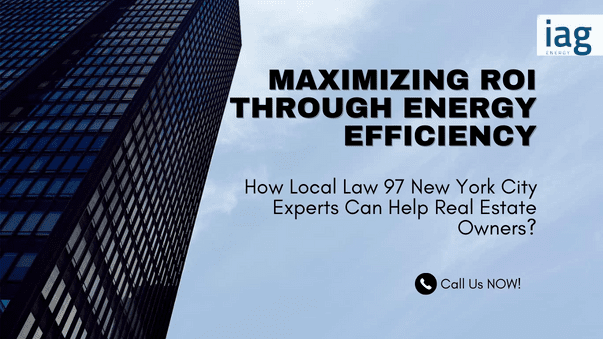What is Local Law 97?
Local Law 97 is a piece of legislation that the New York City Council enacted in April 2019 as a part of the Climate Mobilization Act. Under this law, buildings over 25,000 square feet in size are required to meet strict energy efficiency standards or face hefty fines. It mandates strict carbon emissions caps on buildings over 25,000 square feet, covering over 25,000 properties. The carbon caps are based on a building’s occupancy type and are measured in pounds of CO2 per square foot per year. Building owners must submit annual reports detailing their energy usage and carbon emissions to ensure compliance with Local Law 97.

What is required to be compliant with Local Law 97?
To comply with Local Law 97, you must take several steps as a real estate owner in New York City.
- You need to conduct an energy audit of the property and identify areas for improvement. Based on the findings, you should develop a plan to reduce carbon emissions to meet each year’s carbon limits and ultimately achieve net zero by 2050.
- You must submit an emissions intensity report annually to the Department of Buildings. Some of the information that will be included in the report is the property’s annual carbon emissions, the breakdown of different occupancy groups in the building, and the gross square footage of the property.
- You should work with a qualified team of professionals who specialize in green building practices. These experts can guide the selection of appropriate materials and technologies to help achieve energy efficiency goals while ensuring compliance with Local Law 97 regulations. Compliance with Local Law 97 will help landlords save money on utility costs as well as avoid paying sizable fines to the City, and help create a sustainable environment for the future.
Challenges of Implementing Energy Efficiency
One of the organization’s most significant challenges when implementing energy efficiency and sustainability strategies is figuring out where to start. The sheer magnitude of the task can be overwhelming, especially for those new to the field or with limited resources. To begin with, organizations need to assess their current energy usage patterns and identify areas that require improvement. It often involves conducting an energy audit, which helps identify inefficiencies and areas where energy can be saved. Once these areas have been identified, organizations can prioritize their efforts based on the potential savings and difficulty level involved. Implementing energy efficiency in large buildings is daunting for maintenance and engineering staff. With so many systems and technologies to oversee, monitoring everything without transparency or proper communication can be challenging. This lack of clarity can lead to inefficiencies.
How Local Law 97 experts can help real estate leaders?
Real estate owners can avoid extra fees while accumulating savings through increased energy efficiency measures that experts of Local Law 97 take, including the following:
- Conducting energy audits to identify areas where improvements can be made.
- Recommending cost-effective upgrades such as LED lighting or HVAC system improvements.
- Helping clients navigate the various incentives and rebates available for implementing these upgrades.
Real estate owners should ensure they meet immediate and long-term emission reduction goals while saving money on energy bills. Partnering with Local Law 97 experts like IAG Energy can provide real estate owners with the knowledge and resources needed to comply with regulations while maximizing the financial benefits of increased energy efficiency. Non-compliance with Local Law 97 can significantly penalize real estate leaders, but the consequences do not end there. Failure to meet the energy efficiency standards set by the law can also lead to higher operating costs due to increased energy consumption. So real estate leaders must enlist the help of Local Law 97 experts who can guide them through compliance and provide strategies to create added energy. Local Law 97 experts know the intricacies of the law and understand how it affects different buildings. They work with In-house building Maintenance staff to identify areas where they may be non-compliant and develop plans prioritizing energy efficiency. Using their expertise, Landlords can reduce their carbon footprint, cut operating costs, and attract tenants who value sustainable practices.
A greener future with Local Law 97
Introducing strict greenhouse gas emission limitations and severe fines within its program makes it feasible for Local Law 97 to be the first stepping stone for New York City and the rest of the nation to improve their condition in the face of hazardous levels of greenhouse gases. These new regulations will be challenging to be fulfilled with existing methods, so commercial real estate professionals must be updated to achieve benefits in the long run.
In summary, Local Law 97 experts offer valuable insight into navigating compliance requirements while implementing strategies that benefit the environment and business operations.
At IAG Energy, we can assist you in enhancing operational efficiency and reducing energy use, making carbon footprint reduction a reality. We help you navigate the complex regulations and requirements of Local Law 97. Call us now! 212-235-5611.